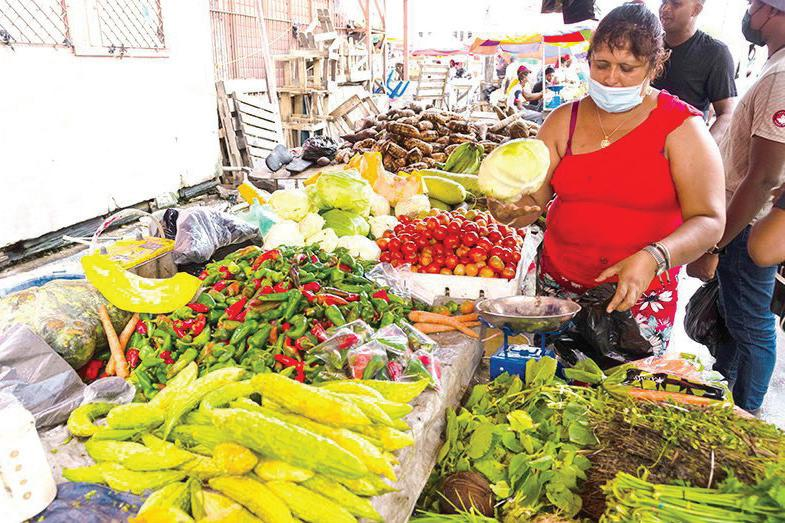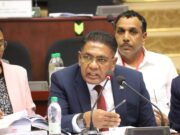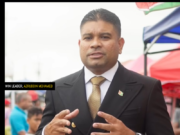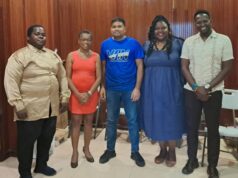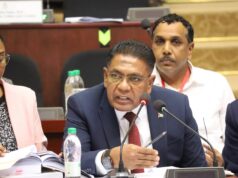Dear Editor,
Most law-abiding citizens would agree that so long as they are in Guyana, they are obliged to obey our constitution, the supreme law of the land, and all other laws that are passed by parliament in keeping with said constitution. Citizens know that once they are within the jurisdiction of Guyana, that is its 83,000 square miles of territory, they are subject to its laws.
By the same token, most Guyanese believe that once they are outside of Guyana, they are beyond the reach of “GT’s finest”. It is for this reason that persons in the past have fled the (territorial) jurisdiction as described above (“backtrack”), if they may have run afoul of the law. Notable examples of these are Mr. Roger Khan and Mr. Marcus Bisram. However in the case of Mr. Khan, he was arrested in Suriname and subsequently prosecuted in the US for an offence committed there, and has since returned to Guyana. As for Mr. Bisram, he was somehow able to leave Guyana after having been charged for murder but was returned to Guyana through a process called extradition, to let the local law run its course – he was acquitted.
It may come as a surprise to many that the laws of Guyana can also apply to a Guyanese outside of Guyana as, under certain conditions, jurisdiction can be founded on the basis of nationality, rather than territory as was previously explained. While the exercise of jurisdiction abroad based on one’s Guyanese nationality is largely at the discretion of the state, it is usually reserved for serious crimes, and subject of course to due process and the availability of resources to pursue same.
Another way in which international law permits a state to exercise its jurisdiction abroad is where the person is accused of committing a serious offence against the national security of that state. The case of former Guyanese parliamentarian Abdul Kadir comes to mind, who was arrested in Trinidad and Tobago in 2007 en route to Iran via Venezuela. He was arrested for conspiracy in a terrorist-related plot to blow up the fuel tanks and pipelines at JFK airport in New York, was extradited to the US and convicted and sentenced to life imprisonment. Kadir died in prison.
It is also possible for a state to exercise what is called universal jurisdiction, which is neither linked to the territory of the state nor the nationality of the person. This jurisdiction concerns serious crimes such as war crimes, torture, murder and genocide, wherever they may have occurred. On this basis, General Augusto Pinochet was arrested in the UK in 1998 at the request of a Spanish judge, for torture committed during his dictatorship in Chile from 1973-1990. More recently in November 2024, it is on a similar basis that an international arrest warrant was issued for Israeli Prime Minister Benjamin Netanyahu for alleged commission of war crimes and crimes against humanity in the Gaza.
The examples cited above all involve an alleged act or omission which occasioned the exercise of the relevant jurisdictional principle, be it territoriality, nationality or universality. However our friends up North in the most powerful nation in the Western Hemisphere have taken it upon themselves over the decades to extend the long arm of US law extra-territorially, even in circumstances where no act nor omission may have occurred: in what could be called “anticipatory jurisdiction”, individuals outside of the US, as well as third states, have been sanctioned by the wide net of the extra-territorial application of US legislation.
Two examples of its effect in the Region come readily to mind: through the 1996 Helms-Burton Act and a sanctions regime administered by the US Office of Foreign Assets Control (OFAC) of the Treasury Department, companies that do business with Cuba could be penalized for any subsequent business transactions in the US. This short-sighted policy, while prohibiting US companies from pursuing lucrative business opportunities in Cuba in tourism, air transport and other services, has allowed European and other companies like the Melia Hotel Chain to gain significant commercial advantages and market share over their US competitors.
More recently, the government of Trinidad and Tobago, before it could proceed with concluding a deal with Venezuela for exploitation of the offshore Dragon Gas field, had to seek a “no objection” from the US, thousands of miles away, because of the existing sanctions the latter faces and the possible future implications for Trinidad and Tobago. As it turns out, the approval given in 2023 by the Biden Administration was recently revoked by the new Trump administration, leaving the Trinidad and Tobago NGL Company with millions of dollars in potential losses.
During the Biden administration, sanctions against Venezuela had been eased in the Democratic party’s “softer softer” approach to President Maduro, allowing Chevron to resume business there. But while the Trump administration had in February 2025 initially re-imposed those sanctions and ordered Chevron to cease operations, it had also, as an apparent example of the transactional approach it takes to certain issues, caused the Treasury Department to reissue new authorisations in July, allowing Chevron to operate once again, but with limitations. And whether as an example of the administration’s unpredictability, or simply a case of “lef hand ain’t know wha the right hand doin”, the Justice Department has simultaneously doubled the bounty on President Maduro’s head to US$50 million, while the Defence Department recently deployed warships off Venezuela’s coast, to confront Venezuelan-based drug traffickers!
While this new OFAC arrangement for Chevron in Venezuela could pass for a form of self-imposed “sanction-busting”, Russian President Vladimir Putin, one of the most sanctioned leaders, was recently given a red-carpet welcome on US soil by none other than President Trump. Putin, who has an ICC warrant out against him for war crimes – the US does not recognize the jurisdiction of the ICC – was given full Head of State treatment.
So if a country like Venezuela, or a President like Putin under sanction, can both be given a “bly” by the US, what then is so special about Mr. Azruddin Mohamed that fire and brimstone would rain down from the US on Guyana, were he to become an elected Member of Parliament, even on the opposition benches we were told, by the distinguished resident US Ambassador, Ms. Nicole Theriot.
It will be recalled that Mr. Mohamed, some family members and his companies were sanctioned in 2024 by OFAC. Soon after, ExxonMobil, which was involved in a construction project with a consortium which included Mr. Mohamed’s company, severed ties with him, in compliance with the sanctions; Mr. Mohamed’s company also exited the consortium: that in fact, is how OFAC sanctions are intended to work (but who knows, maybe he too will in time get a “bly”, if reports about meetings between himself and US officials are true).
But events have taken an unusual turn since Mr. Mohamed’s entry into politics in June as a presidential candidate for the WIN party. Some local banks have closed the accounts of his party officials and some local airlines have declined boarding to them as well. Although none of these people are themselves under any kind of sanction, local or international, the banks have cited internal procedures as the reason for this course of action; one company, Roraima Airways, reportedly cited the OFAC sanctions (Mr. Mohamed recently travelled to Barbados), while another dismissed one of its workers who is associated with the WIN party.
To the best of my knowledge, the US has not put out an arrest warrant for Mr. Mohamed, neither have they requested his extradition to face any charges there. Of course, “AzMo” is not the leader of a big oil-producing nation like Venezuela, or a global power house like Russia. What then is so special about him that local businesses are avoiding himself and his
party officials like COVID?
Last year when the sanctions were first handed down on Mr. Mohamed, the US Ambassador made it clear that she did not work at the Treasury Department and cited confidentiality requirements regarding the disclosure of information related to the matter. And yet this year, even after the US Secretary of State issued an all-missions circular instructing US diplomats not to comment on the fairness or integrity of elections, Ms. Theriot made bold enough to say that Mr. Mohamed’s participation in the government, or even in the opposition, would be ‘concerning’ and ‘problematic’ for the US government. Ms. Theriot also said that the US private sector would re-think its relationship with the country.
Some might argue that the dear lady Ambassador, by her statements, may have put her proverbial thumb on our electoral scales. Would Her Excellency have us seriously anticipate ExxonMobil rethinking its billion-dollar relationship with Guyana because of one man’s political fortunes? Will they lift anchor on those FPSO’s and sail away from the cash cow that is the Guyana offshore oil reserves? Should Chevron write off its US$53B acquisition of Hess Corporation’s stock because of the WIN presidential candidate’s popularity? Indeed the comments of the distinguished Ambassador stand in stark contradistinction to the recent OFAC (re)easing of sanctions to allow Chevron to operate in Venezuela, and pales considerably when considered in the light of President Trump’s welcome of President Putin on US soil.
In a reply to enquiries from lawyers for the Mohamed family, OFAC issued a document reacting to the steps that have been taken by the banks against his political associates in WIN. Most likely because it is a legally drafted document – y’all know how them lawyers stay! – it is open to different interpretations, especially if it is read selectively. For example, it is unclear what is meant by ‘providing material support’ to a sanctioned person: does holding a bank account qualify, or does the holding of an account facilitate ‘providing material support’? Neither is it well defined what amounts to ‘transactions with the sanctioned individual’ nor ‘association’ with him. For its part, the Carter Center in its commentary on the matter stated that ‘banks may be over-complying with US sanctions’.
In his reading of the OFAC document, Vice President Bharrat Jagdeo correctly opined that OFAC would not tell the banks in Guyana how to run their affairs. As is stated in the document, ‘OFAC will not direct an entity to conduct activity that undermines its policies and procedures’; indeed the banks have cited their internal procedures as the basis for the account closures. This therefore begs the question, if not OFAC, then who can direct the banks as to the correctness or otherwise of their policies within the sovereign territory of Guyana?
It is submitted that the closure of the accounts of political associates of Mr. Mohamed who are themselves not sanctioned persons, in a precipitate move in anticipation of them possibly ‘providing material support’, as undefined as that term is, is in tension with the fundamental rights provisions of the Constitution, specifically Article 147, which provides inter alia for persons to ‘associate with other persons and in particular to form or belong to political parties…for the protection of his or her interests’.
It was stated at the outset that the Constitution is the supreme law of the land; it is also trite law that any Act – much less a secondary source like internal company policy – which is inconsistent with the Constitution (for example, Article 147) shall, to the extent of that inconsistency, be unconstitutional, null and void and of no effect. It is therefore not for OFAC, but rather for the Government of the day, as the upholder and guardian of the Constitution, to bring such inconsistency to the attention of the relevant business entities and cause it to be remedied as soon as practicable, so that all citizens can exercise their right to vote, which is also set out in the Constitution (I trust that the Hon. Attorney General would not also characterize this position as “baseless and frivolous”, grounded as it is in the fundamental rights provisions of the Constitution, our supreme law).
On the assumption that all the Presidential candidates are committed to respect for the Constitution and the right of the citizenry to associate freely and to vote, I have to believe that they all would be favourably minded to signing a Joint Declaration upholding the Constitution and the sanctity of the electoral process and the people’s right to hold opinions and exercise their choice in the upcoming elections. Should any of our potential leaders not be so inclined, the electorate would no doubt draw its own conclusion about them. I would be willing to prepare a first draft of the Declaration for their kind consideration.
The French President in “Hostage”, the new drama series on Netflix, has a great line in her conversation with the British Prime Minister: “People want the truth from their politicians”. Here in Guyana, thanks in part to OFAC and the overzealous reaction of some members of the private sector, we have an opportunity for life to imitate art, and for our own politicians to be truthful and commit in writing to the supremacy of the Constitution over internal company procedures, as well as to the protection of the people’s right to associate freely and to vote. How say you, ladies and gentlemen?
respectfully,
Neville J. Bissember

